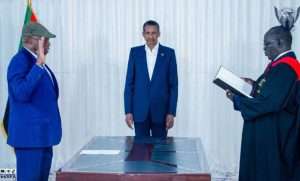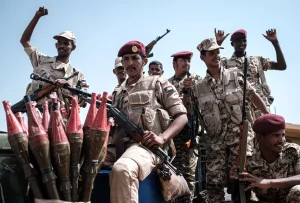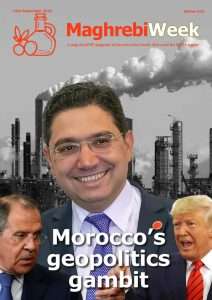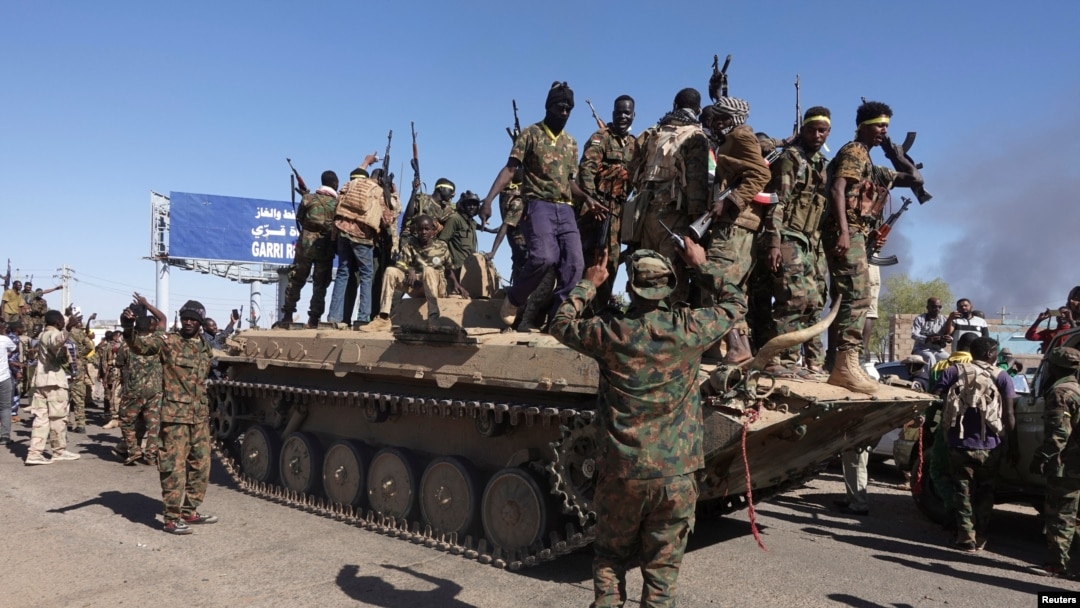Osman Mirghani: Sudan’s ‘parallel’ government is doomed

In recent weeks, the debate over the so-called “parallel government” returned to the fore in Sudan. In an attempt to present themselves as an alternative political authority, the Rapid Support Forces (RSF) released a video of their commander, Mohamed Hamdan Dagalo, also known as Hemedti, and members of his “presidential council” taking their oaths of office.
However, this spectacle does not change the fact that this is an imaginary government. Regardless of the slogans they use to prop up their legitimacy, these theatrics are nothing more than a gambit aimed at sowing confusion and projecting influence following the RSF’s crushing military defeats over the course of the army and its allied forces’ ongoing advance.

Nothing underscores the fact that this “government” exists only in the media than its very first decision: appointing a “permanent representative” to the United Nations. It is an absurd move: how can they appoint a representative to an international institution that had clearly refused to recognize parallel authorities and reaffirmed its firm commitment to Sudan’s sovereignty, independence, unity, and territorial integrity?
This so-called government does not change anything on the ground, nor does it enhance the legitimacy of the forces behind it. Moreover, it does not have the means to achieve its stated objectives, and several factors render the failure of this inevitable; some of these factors are presented below:
– Lack of legitimacy: International and regional organizations, as well as several countries, have refused to either acknowledge or engage with it, affirming their support for Sudan’s official state institutions and the country’s unity, sovereignty, and territorial integrity.
– RSF’s record of human rights abuses. It is broadly despised in Sudan because of its long history of atrocities against civilians across the country, from Khartoum and from Gezira to Darfur and Kordofan. The hatred of the Sudanese for the RSF rules out the possibility of popular legitimacy; indeed, most citizens see its pretense to being a “government of peace” as a farce. Wherever these forces go, they bring death, ethnic violence, mass displacement, and famine with them. They are a vehicle for terror, not security or stability.

– The RSF is a militia unfit to govern. The group’s structure is designed for war, and its modus operandi is founded on brute force. It lacks any of the capacities required to run a state, as demonstrated by the failures of the administrations it had formed in areas that used to be under its control. Indeed, these bodies were little more than a media stunt whose activities were largely limited to occasional video appearances on social media, with real authority in the hands of unruly recruits.
– Fragile alliances: Hemedti and his brother Abdelrahim’s alliance with Abdelaziz al-Hilu, leader of the Sudan People’s Liberation Movement-North, as part of “Tasis” (or the Sudan Founding Alliance), is a fragile marriage of convenience. The parties have a long history of military and tribal clashes, and their tenuous partnership will probably not last long. Moreover, the RSF’s adoption of the SPLM’s slogans about secularism is a joke. What do these forces or their leader know of secularism, a term he even struggled to pronounce as they took their oaths?
– Internal schisms: The RSF is not a unified bloc, but a coalition of militias bound by tribal and regional loyalties. Its forces have clashed amongst themselves on several occasions, and various factions have complained of discrimination and racism. Disputes over resources and power remain probable. During the formation of the “Tasis government,” some tribal groups complained of marginalization and threatened mutiny. Powerful tribal constituencies openly oppose RSF leadership and its project, declaring it a threat to be confronted.
The RSF leadership sought to show that they are more than an armed militia through the announcement of this government, projecting an image of the RSF as a political actor that can govern and implement a “state-building project” alongside its “Tasis” allies. However, this image quickly collapses in the face of reality: international and regional bodies have refused to recognize it because they know they are dealing with a militia, and there is nothing to suggest that it could transform from a military force into a governing authority.
The RSF’s “government” is nothing more than a media spectacle, a political illusion, and a ploy to project relevance after the series of military defeats it has suffered.
At most, international actors may treat the RSF as an armed group that must be negotiated with to end the war, but they will never recognize it as a government. The Sudanese army remains the state’s official military institution, and the world continues to engage with it on that basis.
In truth, the RSF’s so-called government cannot even fully impose its authority across Darfur and Kordofan, let alone claim to represent all

of Sudan. The RSF does not have absolute control in these regions, as the Sudanese army and its allied forces maintain a strong presence in some pockets. They have repelled more than 235 attacks on al-Fashir, held key towns and military garrisons in Kordofan, and are currently preparing a major operation that could turn the balance of power on its head.
READ: Bruno Waterfield: suppressing debate is eroding our democracy
Accordingly, the RSF’s “government” is nothing more than a media spectacle, a political illusion, and a ploy to project relevance after the series of military defeats it has suffered. In short, it is a government on paper only; it has neither substance nor prospects for success.
The views expressed in this article belong to the author and do not necessarily reflect the editorial policy of Maghrebi.org. Osman Mirghani is Editor-at-Large of Asharq Al Awsat.
If you wish to pitch an opinion piece please send your article to grace.sharp@maghrebi.org.
Want to chase the pulse of North Africa?
Subscribe to receive our FREE weekly PDF magazine













